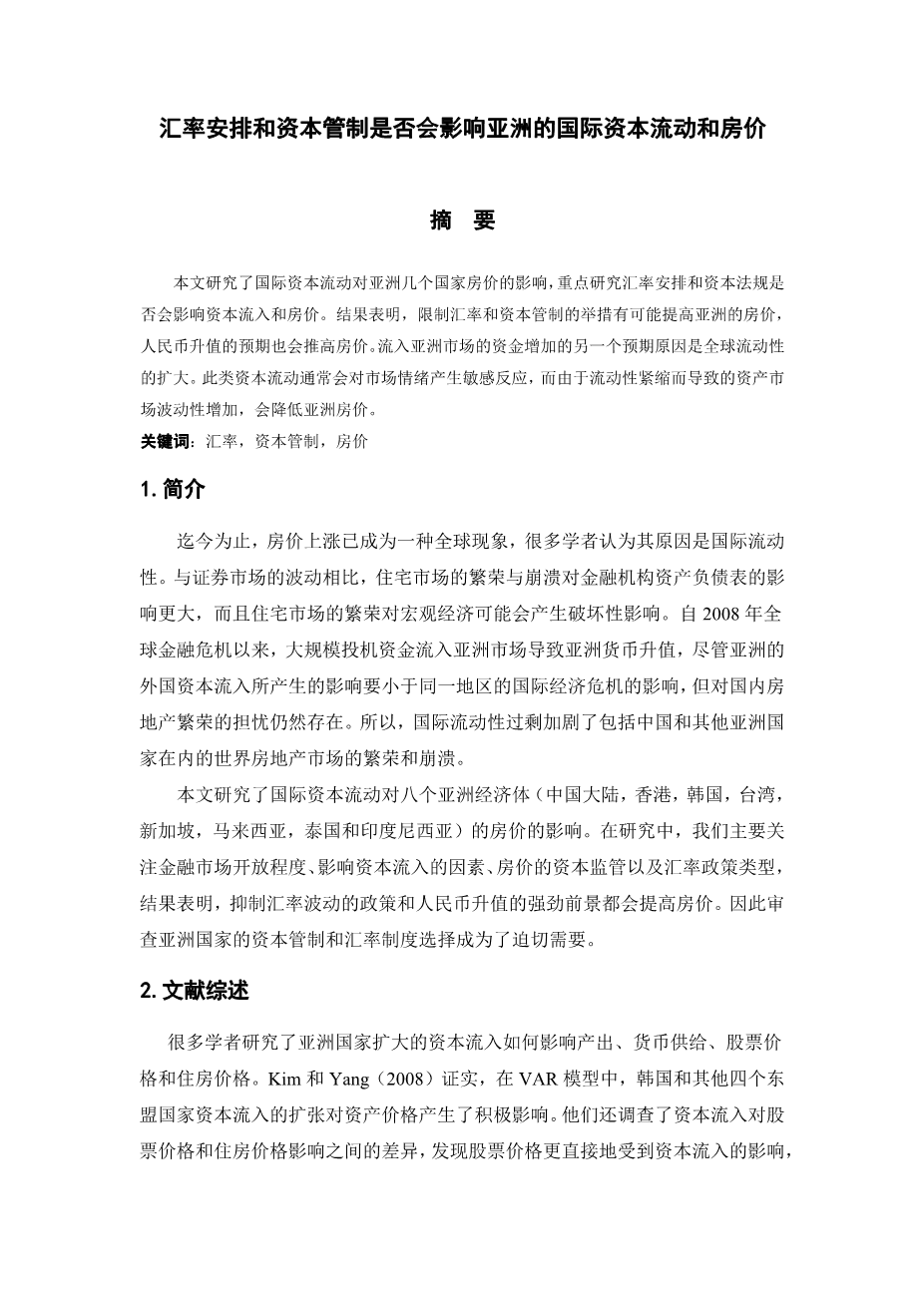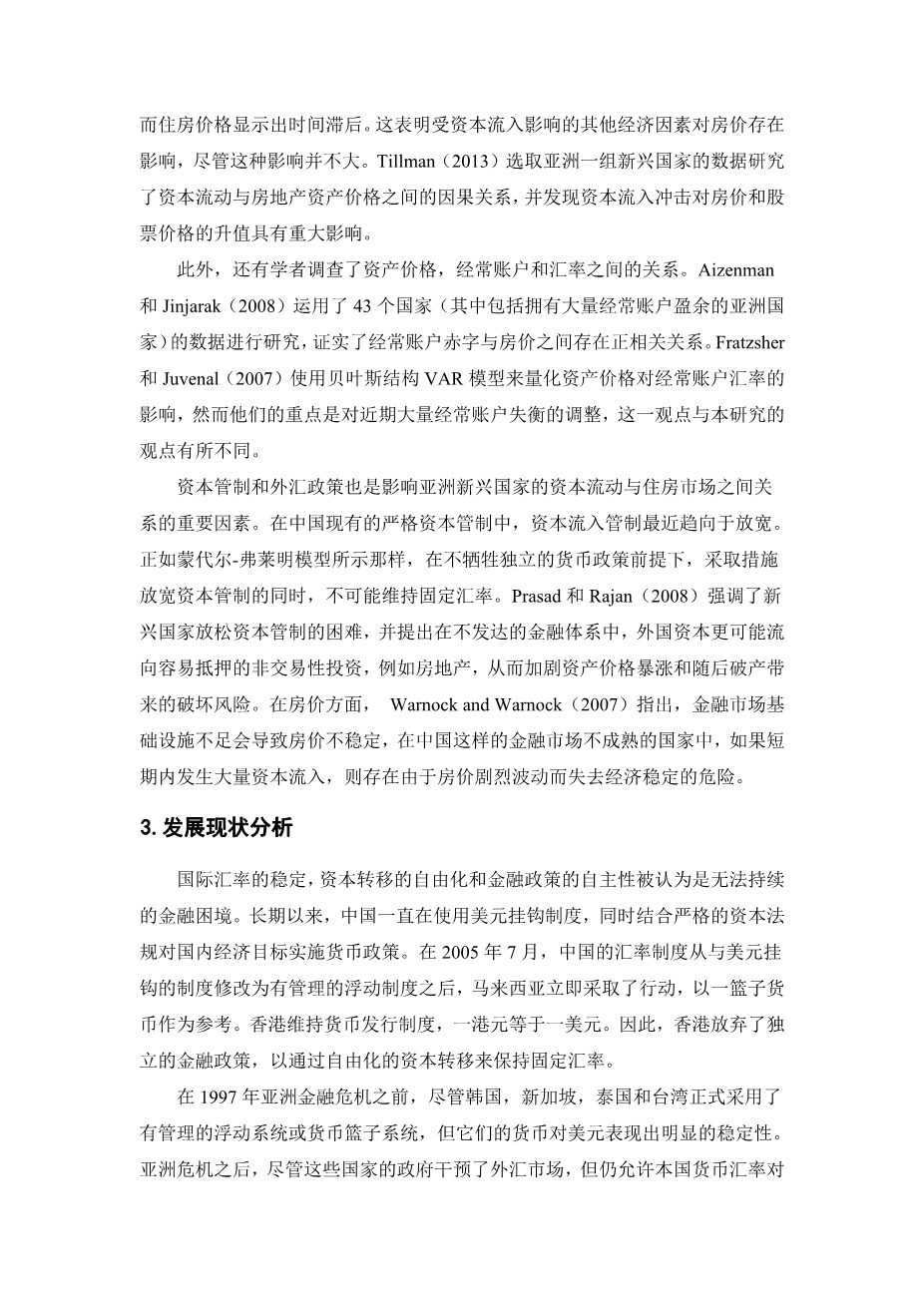Journal of Asian Economics 39 (2015) 1–18
Contents lists available at ScienceDirect
Journal of Asian Economics
Do exchange rate arrangements and capital controls influence international capital flows and housing prices in Asia?
Sanae Ohno a,*, Junko Shimizu b
a Faculty of Economics, Musashi University, 1-26-1, Toyotama-kami, Nerima-ku, Tokyo 176-8534, Japan
b Faculty of Economics, Gakushuin University, 1-5-1, Mejiro, Toshima-ku, Tokyo 171-8588, Japan
A R T I C L E I N F O
Article history:
Received 9 March 2013
Received in revised form 15 April 2015 Accepted 18 April 2015
Available online 11 May 2015
JEL classification:
F31 F33 F15
Keywords:
International capital flow Housing price
Exchange rate regime Capital control
A B S T R A C T
This paper investigates the influence of international capital flows on housing prices in eight Asian countries, including China. We focus on determining whether exchange rate arrangements and capital regulations influence capital inflows and housing prices. Our results show that an arrangement to restrain the fluctuation of the exchange rate and capital controls has the potential to raise housing prices in Asia. The strong prospect of the Chinese yuanrsquo;s appreciation also pushed up housing prices in China. Another expected reason for the increase in capital inflows into Asian markets is the expansion of global liquidity. Such capital flows often have a sensitive reaction to market sentiment, and an increase in asset market volatility caused by the liquidity squeeze decreases Asian housing prices. These results suggest the need to review capital controls and future exchange rate system options for Asian countries.
copy; 2015 Elsevier Inc. All rights reserved.
- Introduction
Increasing housing prices have, to date, been a worldwide phenomenon, and international liquidity has been indicated as a cause. The residential market boom and its collapse have had a greater effect on the balance sheets of financial institutions than security market fluctuations, and a severely damaging impact of the boom on macroeconomic conditions has been observed. This has been especially evident since the global financial crisis of 2008, as the flow of large-scale speculative funds into the Asian market has led to the appreciation of Asian currencies. Although the effect attributable to foreign capital inflows in Asia is smaller than that attributable to the international economic crisis in the same region, fears of a domestic real estate boom persist. Consequently, analyzing the effects of capital inflows on the residential markets of emerging countries is important.1
International excess liquidity has exacerbated the boom and collapse of world housing markets, including those of China and other Asian countries. After 2004, as the influence of the Asian currency crisis gradually faded, housing prices in Asia soared, especially in countries with large and stable capital inflows.
* Corresponding author. Tel.: 81 3 5984 3763.
E-mail address: sanaeon@cc.musashi.ac.jp (S. Ohno).
1 For example, Ohno (2009) investigated the effect of foreign capital flow on housing prices in seven Asian countries and confirmed that an increase in foreign borrowings by Asian financial institutions caused the domestic housing price boom.
http://dx.doi.org/10.1016/j.asieco.2015.04.004
1049-0078/copy; 2015 Elsevier Inc. All rights reserved.
Aizenman and Jinjarak (2008) identified a worldwide comovement of real estate prices and confirmed a strong positive association between current account deficits and the appreciation of housing prices. For example, a negative correlation was found in the cases of some East European countries and South Africa, as well as others. In the case of Asian countries, especially Hong Kong, Singapore, China, Taiwan, and Malaysia, however, a positive association between the current account surplus and the rise of housing prices was found, which suggests the existence of other special factors that affect housing prices.
One possible factor is sufficient foreign-exchange reserves having been accumulated and the existence of twin surpluses in the current and capital accounts, which can be regarded as two sides of the same coin. The twin surpluses are possibly attributable to a massive foreign exchange intervention and the tide of deregulation in the area of foreign capital control.
Some Asian countries, including China, South Korea, and Taiwan, have recently faced persistent capital account surpluses in spite of their high current account surpluses. The Philippines, Indonesia, and Thailand have shown a tendency for twin surpluses since 2005 or 2006.2 What can be identified as a common pattern for the Asian countries, including exceptional nations such as Hong Kong, Singapore, and Malaysia, whose capital accounts tend toward deficits, is that they have received a growing amount of foreign capital on a gross basis through the 2000s.
Asian countries, to a greater or lesser extent, have implemented foreign exchange intervention, which has potentially stimulated housing investments. Two channels of interna
剩余内容已隐藏,支付完成后下载完整资料


英语译文共 10 页,剩余内容已隐藏,支付完成后下载完整资料
资料编号:[416036],资料为PDF文档或Word文档,PDF文档可免费转换为Word


